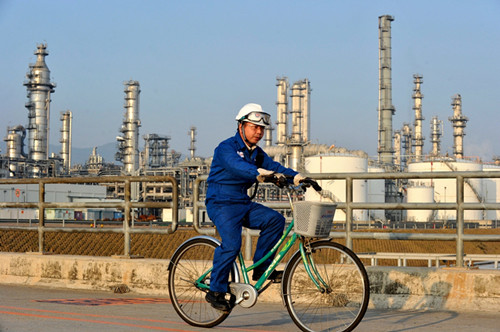Opening-up, global ties boost energy industry


A bicycle-riding security supervisor patrols the industrial park of CNOOC and Shell Petrochemicals Co Ltd, which is one of the largest petrochemical joint ventures in China. [Photo/Xinhua]
BEIJING-With its second ethylene cracker in South China starting operations this month, China National Offshore Oil Corporation or CNOOC pushed its cooperation with Shell Petrochemical Company to a higher level.
The 1.2-million-metric-ton project has more than doubled the capacity of the company's Nanhai petrochemicals complex, thus supporting this 50:50 joint venture of CNOOC and Shell in meeting the growing Chinese demand.
"The expansion project demonstrates great synergies between CNOOC's engineering, construction, and management capabilities, and Shell's advanced technologies in chemicals," said He Zhongwen, president of CNOOC Oil& Petrochemicals Co Ltd, a subsidiary of CNOOC that runs the Nanhai complex.
The project also demonstrated how international cooperation has driven development of China's energy industry, which, like many others, has benefited greatly from the country's opening-up efforts in recent decades.
Foreign energy enterprises have played an important role in the investment, design, construction, and management of China's energy projects, said an unidentified official from the international cooperation department of the National Energy Administration or NEA.
Since 2012, China has signed more than 100 cooperation agreements with other countries, set up 56 bilateral energy cooperation mechanisms and participated in 29 multilateral ones, which have brought a number of influential projects as well as advancement in energy investment, technologies, equipment, and services.
"Without participation in the international market, China is not able to bring on its transformation toward clean, low-carbon energy in the new era," said Bai Jun from the Institute of International Energy of the National Development and Reform Commission or NDRC.
Besides partnerships with foreign energy enterprises, China has also boosted energy imports to satisfy domestic demand and improve its energy structure.
In the first quarter of this year, China imported 20.61 million tons of natural gas, up 37 percent year-on-year, while oil imports went up 7 percent to 110 million tons.
The import increase came amid China's domestic shortage in natural gas supply since last year as the country needs more clean and high-quality energy to fuel economic development while protecting environment.
"It is necessary for China to fill the demand-supply gap in the domestic energy sector through international cooperation," said Jing Chunmei, a researcher at China Center for International Economic Exchanges, noting that China still faces issues of insufficient and imbalanced energy supply.
Zhou Dadi, a senior researcher at the Energy Research Institute under the NDRC, said that further opening up of the energy sector would make up for China's energy shortage and help diversify energy supply.
Meanwhile, China could improve its energy development and management via means of energy technology exchange, he said.
Energy experts also believe that China's continued opening-up efforts will benefit the global energy sector as well. That's because the country is exploring all ways of cooperation with energy-rich partners.
Foreign investors see the steady expansion of both the energy industry in China and the country's energy demand as proof of a vast and stable market.
In 2017, China imported 1.51 million tons of liquefied natural gas and 7.6 million tons of crude oil from the United States.
Meanwhile, with natural gas pipelines under construction, China is expected to obtain up to 38 billion cubic meters of natural gas from Russia annually upon project completion.
MOST POPULAR
- 1 China to give visa-free treatment to another 9 countries
- 2 China fully opens manufacturing sector to foreign investors in landmark opening up move
- 3 China's import expo attracts record-breaking participating countries, exhibitors
- 4 China's door opening even wider to foreign visitors, businesses
- 5 China revises rules to ease foreign strategic investment in listed firms
Editors' Picks
 Video:
Peru sees new port open
Video:
Peru sees new port open
 Infographic:
China's public holidays for 2025
Infographic:
China's public holidays for 2025
 Infographic:
Basic facts of APEC
Infographic:
Basic facts of APEC
 Infographic:
Wrapping up the 7th CIIE: Data recap
Infographic:
Wrapping up the 7th CIIE: Data recap



